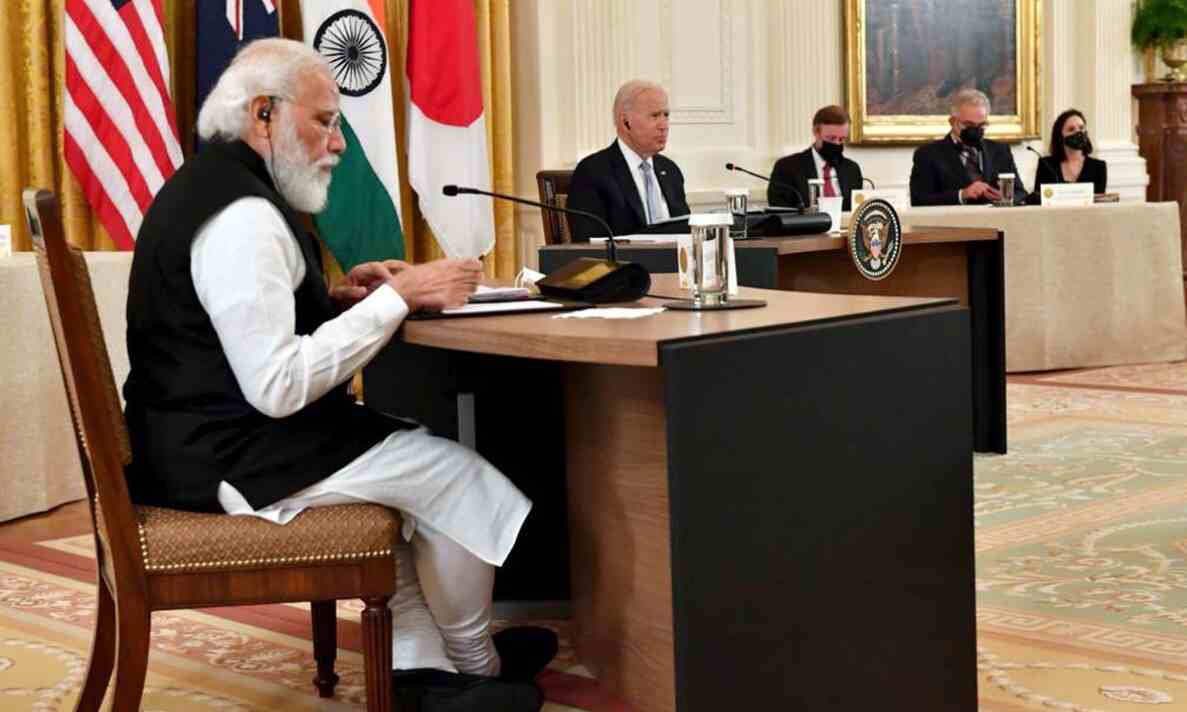Moving forward

With a two hour meeting at the White House, the Quad has finally and distinctly swung into motion. What once started as a relief group following the 2004 Asian earthquake and tsunami has now reached a level where it can be seen as a new coalition in the Indo-Pacific. But a coalition to what end? India, for one, has never particularly been comfortable with the idea of the Quad being seen as a military alliance. India has always been averse to the idea of sliding into big power blocs. While India sees value in joining the strategic grouping, it is unlikely to actually appreciate any 'us vs them' kind of narrative forming around its participation. It is in this light that one can understand why India would participate in the recent Shanghai Cooperation Organisation meet in Russia. Though India did not send its troops for the SCO military exercises last year where both China and Pakistan were in attendance, this year India sent out a team of 200 personal for 'Exercise Peaceful Mission. The idea, as always, is for India to not put all its eggs in one basket. Unlike AUKUS, which is emerging as an unambiguously hard-edged military alliance, the Quad seems to be heading along a path of non-military cooperation. Everything from vaccines to cybersecurity is covered in its loosely bound structure which currently has no provisions for any kind of military pacts. Though all four countries have their own specific grievances with Beijing which range from economic to security concerns, none of them seems interested in entirely alienating China with some version of an 'Asian NATO' as China calls the Quad. Even the US, the country bringing together these anti-China fronts, is not interested in completely alienating China as evidenced by the US proactively approaching China for cooperation on climate change. But being non-military does not mean that the pact isn't tailored with China in mind. The pact came together because all four member nations see China as a potential threat to free trade and the global order. All four countries are interested in not only reducing the influence of China on the global supply chain but also countering key Chinese global initiatives such as the Belt and Road Initiative with their own joint infrastructure efforts. This does not mean that the organisation does not have some components for military cooperation. Counter-terrorism, particularly in regards to Afghanistan, is a key stated priority of the four Quad nations. More importantly, this is not the final shape of this organisation. The Quad is still evolving as it has since 2004 and is likely to continue evolving even in the future. While the Quad may not be operationalised as a military pact for the time being this does not guarantee that this will remain the case in the future. India currently is facing an increasingly strenuous security situation. Its growing border tensions with China aside, the withdrawal of coalition forces from Afghanistan has created the threat of a new front being opened up against India. In this regard, the presence of AUKUS may be seen as an overall boon for India even if the pact is alienating Europe. Some may argue that AUKUS proves the US is not entirely comfortable with India as its strategic partner in the region. After all, though the US was comfortable sharing its top-secret nuclear propulsion technology with Australia, would it ever do the same for India? But such concerns aside, AUKUS has utility for India as well. Experts say that Quad and AUKUS could complement each other by providing a robust anti-China bulwark that India can participate in without explicitly having anything to do with the more provocative AUKUS pact. That said, the Indo-Pacific is a particularly volatile region. Though India accepts and even prefers a non-militarised Quad at the moment, its needs may change in the future as its faces greater security challenges. In this regard, should the Quad fail to adequately adapt, India must be ready to seek out other partnerships whenever and wherever required with a trilateral agreement between India, France and Japan being touted as a possible security framework in the future. This too would be part of India's strategy of not putting all its eggs in one basket.



